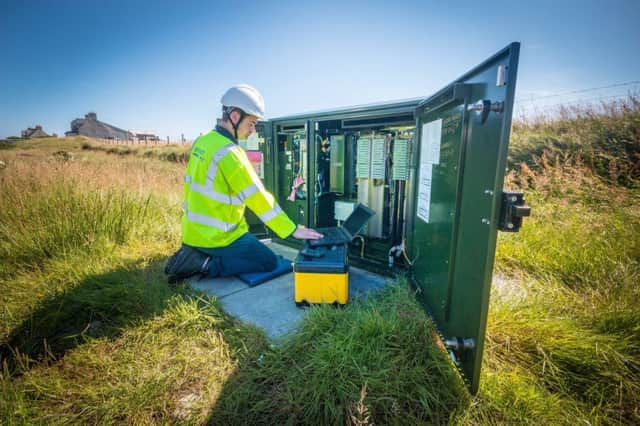Worst areas in Britain for broadband speed all in Scotland


The rural constituency in north-west Scotland had just 65.6 per cent of its broadband connections reach download speeds of 10 megabits per second (Mb/s), according to analysis by the British Infrastructure Group of MPs.
Further analysis by MPs of download speed data recorded by Ofcom in 2016 found Scotland had the four worst performing parliamentary constituencies in the UK for their broadband speeds.
Advertisement
Hide AdAdvertisement
Hide AdMore than 60 per cent of connections in three other Scottish constituencies – Na h-Eileanan an Iar, Argyll and Bute and Orkney and Shetland – failed to reach download speeds of 10 Mb/s.
Scotland had eight of the 20 worst performing constituencies, closely followed by Wales with seven.
Kingston upon Hull East was the worst constituency in England for download speeds, with 56.8 per cent of connections failing to hit the government’s proposed universal service obligation.
Yesterday more than 50 MPs have backed calls for urgent improvements to Britain’s broadband. The British Infrastructure Group of MPs want automatic compensation for families who do not get the internet speeds they pay for, with Ofcom urged to get tougher on providers.
A report by the group, titled “Broadband 2.0”, found as many as 6.7 million UK broadband connections may not receive download speeds above the government’s proposed minimum of 10 megabits per second (Mb/s). Less than half of UK connections are thought not to receive superfast speeds of 24 Mb/s, according to the group.
Ofcom previously found 1.4 million people have download speeds below 10 Mb/s, while the Department for Digital, Culture, Media and Sport said millions of people had not signed up to superfast broadband.
However, the MPs say data gathered by Ofcom does not distinguish between connections for customers not signed up to superfast broadband, and those customers not getting the speeds they are paying for.
They argue the current system makes it “almost impossible” to determine how many households do not receive the speeds set out in their contracts. This is disputed by Ofcom, which said they provide “robust, comprehensive data on broadband take-up and availability”.
Advertisement
Hide AdAdvertisement
Hide AdFormer Tory party chairman Grant Shapps, who chairs the group of MPs, said: “Although broadband is increasingly considered to be an essential utility, the quality of customer services has simply not caught up with demand.”